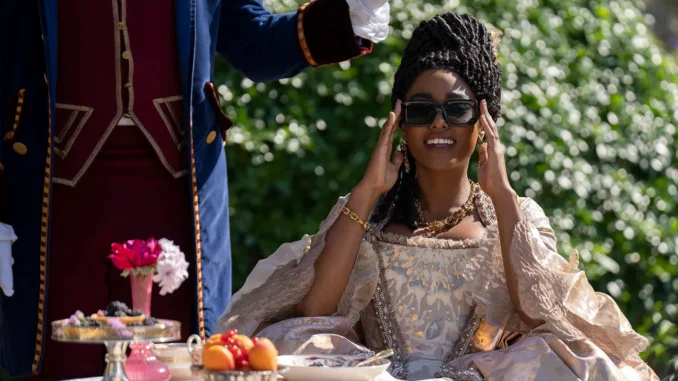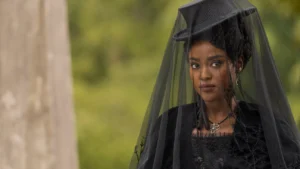
“I saw people who were lighter than me, who were thinner than me, whose proximity to whiteness was higher than mine, and because of that, they were considered what we should aspire to; I decided I wanted to undo that,” says Thomas .
When Bridgerton was first released in 2020, Arsema Thomas wanted so badly to be a part of that world she couldn’t even watch the hit Netflix period romance.
“I don’t know what it was, but sometimes when you see something that you want and you see that it’s already come and gone, it’s difficult to sit and enjoy it without thinking of that,” Thomas, 28, tells The Hollywood Reporter . “I think that was what was going through my mind, that this would be the perfect thing, the greatest thing… to see that it came and went and I didn’t hear of an audition, I was like, ‘Oh, I’ m gutted. I don’t think I can ever watch this.’”
When the actress, who at the time was studying at the London Academy of Music and Dramatic Art, heard there would be a second season of the Shonda Rhimes hit series, she asked her agent to see if there was anything that he could do, but filming had already begun. A week later, however, Thomas’ agent got word of Queen Charlotte and brought it to her.
“I was like, ‘This is a sign. Now I have a reason to watch.’”
Thomas didn’t know what role she was going out until her agent sent in her self-tape. But after three auditions and a Zoom call with director Tom Verica — during which she held back coughs and sniffles while recovering from COVID — she was asked to do a chemistry read.
“The thing is, when you have a chemistry read, it’s between you and maybe two other people,” she says. “So those two weeks were probably the most painful two weeks ever because you’re so close, you can taste it, but you also have to tell yourself: Don’t get your hopes too high because if anything crashes and burns, which it’s likely to, then you’re not going to get hurt too bad.”

Quite the opposite happened when, two weeks later, Thomas found out she landed the role of Lady Agatha Danbury in the Bridgerton prequel. The drama starring India Ria Amarteifio as Queen Charlotte released on Netflix May 4 and sees Adjoa Andoh reprising her role as the elder Lady Danbury and Golda Rosheuvel as the elder queen. The spinoff series became an instant streaming hit, amassing more than 307 million hours viewed to date, according to Netflix’s internal rankings.
Success, for Thomas, is about more than potentially record-breaking viewership, though. It’s about setting a precedent for Black women’s stories on screen — and by extension for Black, queer individuals like themselves to be seen and accepted in everyday life.
“To see the positive response and the excitement and the applause from the Black community and really from everyone to this character and this story, I think is, unfortunately, the stamp of approval that the industry needs to show that these stories should be told. And you will still be successful in telling these stories — and that’s successful in big ass quotes,” she says.
“I came into the industry very in denial. Part of me was like: I’m going to be wrong. This isn’t a place for me. Only three Black actresses can really make it, and I’m the fourth. And to see that that’s not the case, to see that there will be more content created, that more stories of ours will be featured so that people will not look at Black people as a monolith, it just gives me hope.”
Your character has easily become a fan favorite. What do you think it is about Lady Danbury’s story that resonates so well with audiences?
I think there’s something really powerful about what she stands for and the things that she wants unapologetically. Shonda said it so well: This time period is peak women apologizing for everything they want. And to see a woman against that backdrop who goes against that and demands the things that she knows she deserves, is such an empowering thing, especially for Black people and especially for Black women because we tend to be the demographic that is relegated to easily forgotten . When you think of woman, you think of white woman. When you think of Black, you think of Black man and, where does the Black woman fit? And to see her take up space and to see her win in doing that — it’s not a cautionary tale, but rather something that should be galvanizing other Black women to demand the things that they want. And to see her go for the pleasure that she wants, she feels so relatable. She says what we’re all thinking.
How much time did you spend with Adjoa Andoh shaping the younger version of your character?
You can tell that this is a very different Agatha who is a really big departure from the person that we see in Bridgerton. So, I already knew that I was going to be starting from a different place and Tom Verica, the director, said, “This is your own character, make it your own.”